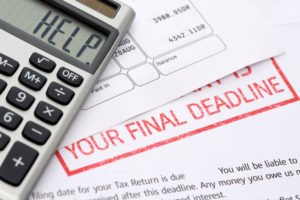Chapter 7 Bankruptcy
Chapter 7 Bankruptcy allows a Debtor to “discharge”, or eliminate, their liability on certain debts. An individual who does not have any non-exempt equity in real property or personal property, and does not have an excess of monthly income, is usually a good candidate for a Chapter 7 case. But to best understand how a Chapter 7 Bankruptcy works, it is important to know how debts are classified.
An “unsecured debt” is a debt that does not have collateral, a Chapter 7 allows a Debtor to discharge these types of debts.
An “unsecured debt” is a debt that does not have collateral, such as a credit card account, medical bill, personal loan, or repossession deficiency. A Chapter 7 allows a Debtor to discharge these types of debts. However, there are certain types of “unsecured debt” which have been afforded special protection by Congress, meaning that they cannot be discharged in a Chapter 7 case. These protected or “non-dischargeable” debts include educational loans, taxes, and domestic support obligations.
A “secured debt” is a debt that has collateral or “security”. The most common types of “secured debts” would be home mortgages, car loans, and furniture accounts.
A “secured debt” is a debt that has collateral or “security”. The most common types of “secured debts” would be home mortgages, car loans, and furniture accounts. A Chapter 7 debtor may choose to keep, or “reaffirm”, on a secured debt in order to retain the collateral. On the other hand, the debtor has the right to “surrender” the collateral and discharge the debt if they are unwilling or unable to make the payments in the future. While the creditor still has the right to foreclose or repossess the surrendered property, they are not permitted to hold the Debtor responsible for any deficiency balance which may still be owed after the house or car is resold.
 In order to determine your eligibility to file a Chapter 7 case, the attorney will need to review the following: verification of income for at least the ninety days prior to the bankruptcy filing, including other income, even though it may not be taxable or otherwise disclosed; bills or other communications from all of your creditors and/or their collection agencies; copies of any lawsuits, judgments, and/ or garnishments against you; income tax returns for the previous 2 years, if you were required to file returns; if you own real estate, you may be requested to provide copies of any county property tax appraisals, or any recent private appraisals which have been performed on your real estate; recent statements for any 401(k), IRA, or any other type of investment program. The full and accurate disclosure of this information is necessary to make sure that the debtor is eligible to file a Chapter 7 case, and that all assets can be protected.
In order to determine your eligibility to file a Chapter 7 case, the attorney will need to review the following: verification of income for at least the ninety days prior to the bankruptcy filing, including other income, even though it may not be taxable or otherwise disclosed; bills or other communications from all of your creditors and/or their collection agencies; copies of any lawsuits, judgments, and/ or garnishments against you; income tax returns for the previous 2 years, if you were required to file returns; if you own real estate, you may be requested to provide copies of any county property tax appraisals, or any recent private appraisals which have been performed on your real estate; recent statements for any 401(k), IRA, or any other type of investment program. The full and accurate disclosure of this information is necessary to make sure that the debtor is eligible to file a Chapter 7 case, and that all assets can be protected.
Presently, the filing fee for a Chapter 7 bankruptcy is $338, however, these fees may be subject to change, due to periodic evaluation of the cost of processing bankruptcy cases by the bankruptcy courts. Attorney’s fees in Chapter 7 cases are usually determined on a case-by-case basis, based upon the amount of time and effort necessary to represent the debtor through the discharge of their case. All fees associated with the filing of the bankruptcy, as well as the manner of payment of those fees, is required to be disclosed to the Bankruptcy Court. The Bankruptcy Court has the authority to order the refund of any attorney fees which are unreasonable or unjustified.
A bankruptcy case cannot be filed unless the debtor has received a credit counseling certificate.
The Bankruptcy Abuse Prevention and Consumer Protect Act of 2005 requires that an individual must participate in credit counseling with a credit counseling agency that is certified by the United States Trustee of the district in which the consumer resides. A case cannot be filed unless the debtor has received a credit counseling certificate. Your attorney will provide the necessary information to you to fulfill this requirement. After meeting with the attorney and reviewing the information, a bankruptcy petition will be prepared. The petition includes statements regarding assets, debts, income and expenses. It also discloses information about any property transfers. Once the petition is filed with the court, the Bankruptcy Court issues a Notice of Bankruptcy to all of your creditors. The creditors are notified that they cannot attempt to collect their debts in any manner – this includes letters, phone calls, lawsuits, garnishments, repossession or foreclosure. Any creditor who ignores the Notice of Bankruptcy faces potential sanctions and fees.
The debtor in a Chapter 7 bankruptcy case is required to attend a Meeting of Creditors, which is scheduled approximately 30-45 days after the case is filed. Your attorney will accompany you to this hearing. The purpose of the Meeting of Creditors is for the Chapter 7 debtor to be questioned about the bankruptcy petition which they have filed, and any property which they own. The meeting is presided over by the bankruptcy trustee, and creditors are invited to attend. There may be additional hearings in a Chapter 7 case, depending upon whether or not the debtor intends to return any property back to creditors, and whether or not any creditors object. Additionally, in a Chapter 7 asset case, where assets may be sold for the benefit of creditors, additional court hearings will be scheduled. If applicable, your attorney will advise you as to whether or not attendance at these additional hearings will be necessary.
Creditors have 60 days from the date of the Meeting of Creditors to object to the discharge of their debts. In order to be successful, the creditor must demonstrate to the court that the debtor has committed some type of fraud or concealment in the preparation of their bankruptcy petition. Creditors can also challenge the discharge of their debts by proving that they were incurred by fraud – for instance if an individual was to lie about their income on a loan application. Likewise, any significant use of credit cards or other extensions of credit in the time period immediately preceding the filing of the bankruptcy may allow the creditor to successfully contest the discharge of their debt. If a creditor is successful, their debt will survive the bankruptcy and they will be permitted to collect the debt after the case is concluded.
The elimination of your unsecured debt in a Chapter 7 bankruptcy case is designed to provide the consumer with a fresh start.
Assuming there are no objections or other opposition to the Chapter 7 case, the Bankruptcy Court will mail out a “discharge” order within 30-60 days after the expiration of the objection deadline. The issuance of the discharge order means that the case is concluded and the debtor is no longer under the jurisdiction of the Bankruptcy Court. The elimination of your unsecured debt in a Chapter 7 bankruptcy case is designed to provide the consumer with a fresh start, without the burden of unsecured debts beyond their ability to repay.



